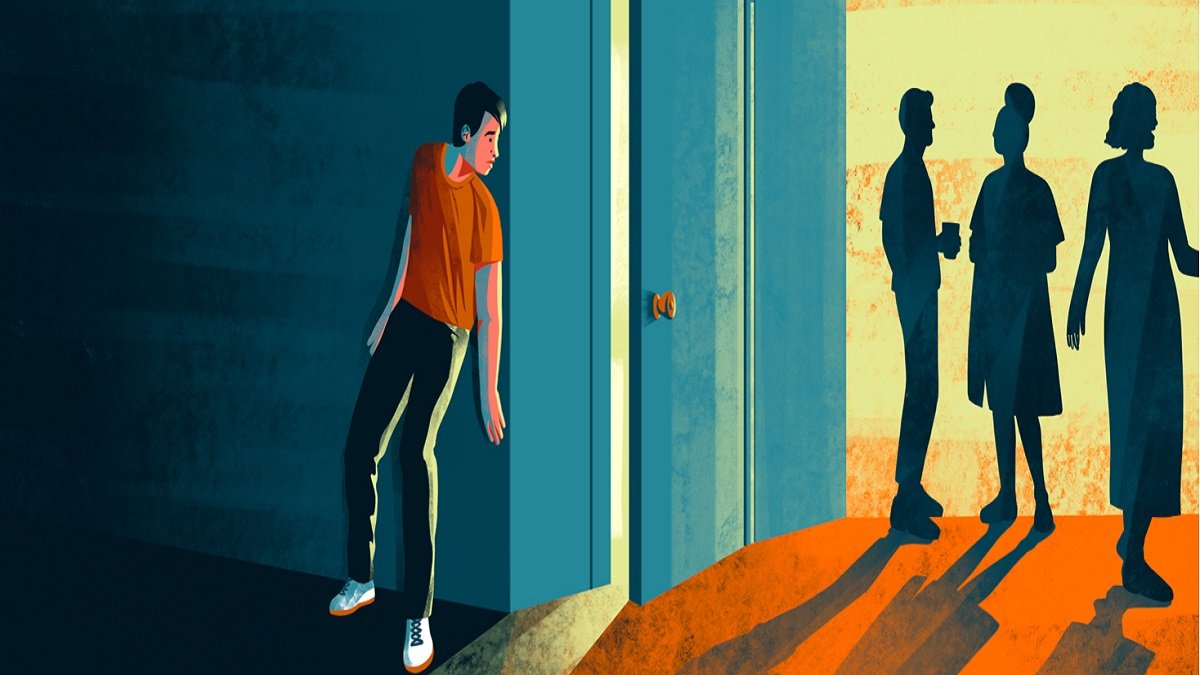Social Anxiety Disorder, which is literally SAD, is anticipated to affect around 15% of the population at some point in their lives. It can deeply impact a person’s life, but there are Tips to Get Over Social Anxiety you can follow.
Social anxiety rectification activities are those things you can do to face & challenge your anxiety. While you may not be able to control or change the roots of social anxiety, which can be genetics, temperament, family history, depressing experience, & stressful social demands, you can adapt new coping strategies to help you manage those symptoms.
People with SAD encounter problems in all fields of their lives. They face trouble making friends & maintaining friendships, getting a life partner, finding a job & building a career, & even passing through the routine aspects of daily life.
Tips to Get Over Social Anxiety

1. Find Out Situations That Trigger Anxiety
Social anxiety doesn’t come up in the same way for everyone. You may feel anxious about situations where you worry about people judging you, from ordering a meal at a restaurant to leaving for the restroom during an office presentation. Conversely, you feel mostly fine simply being around those people — as long as they don’t expect you to express your opinions or speak up.
Finding out why and when you feel most anxious can help you to take the first steps toward finding solutions to this SAD situation. Start by listing events that cause the most uneasiness, the ones that make you feel absolutely helpless. These might include:
- Interviewing for a new job or role.
- Meeting with someone to seek help.
- Asking for your things back or for a loan re-payment.
- Initiating a conversation with someone you are attracted to.
2. Get Yourself Out
You might feel stuck most of the time if you have mild to moderate social anxiety. What is the best way to get unstuck? Do something about it. Although avoiding every kind of social & performance situation can be alluring if you suffer from a social anxiety disorder, it is vital to push yourself out there.
That means welcoming invitations to go places & do those things that make you uncomfortable. Simultaneously, you must prepare yourself to suitably handle being out there.
3. Set Goals
Having unclear goals about what you want to attain isn’t enough. Whether you want to conquer social anxiety or become a Grammy Award-winning singer, it is vital to note your goals down on paper. This will make them real & assessable.
Part of setting a goal involves determining where you want to reach, but it also involves learning & setting a standard for your current position. Then along the way, after you have started to get yourself unstuck, move along & don’t stop. Don’t compare yourself to others on scales of social or financial success; compare yourself to yourself from one month or one year ago.
4. Become Your Best Advocate
Nobody else is going to support you the way you can support yourself. Collect knowledge about Social Anxiety Disorder to make better decisions. Ask for accommodations at work & the community if they can help you. Show them a better picture to understand the struggles you face.
Take a break at social gatherings if you feel the need. Nobody else knows what is tormenting you as you do. Therefore, supporting yourself is among the best Tips to Get Over Social Anxiety you can get.
5. Seek Help
It can be uncomfortable or overwhelming to admit to people in your life that you have Social Anxiety Disorder & might need help. Letting a trusted friend or loved one know you may need some extra support can provide a major boost.
Most of the time, people feel more comfortable in a social gathering with someone trusted. Especially if somebody has been fairly secluded recently, it can be helpful initially to have a companion when you return to a social situation.
The key to this support is aiding an anxious person to be more independent & confident over time. Eventually, people with more comprehensive social anxiety will find it easier to shop or order food alone.
6. Buy Yourself Something New
Retail therapy is evidently not a cure for social anxiety, but sometimes clothing & new things really can make you feel like a new person with a new outlook. Go & buy something you always wanted, like a cool pair of sneakers or that floral printed tee shirt.
It will be like a gift to you from yourself for trying. Going on a shopping spree every now & then isn’t advisable either. You need to take care of your finances, too.
7. Go For Cognitive Behavioral Therapy
Among the various types of psychotherapy available, cognitive behavioral therapy — which entails modifying the way you think & feel about a particular situation, which, in order, can help you to modify your behavior — is a helpful answer to the question, How to Overcome Social Anxiety.
With social anxiety particularly, you need to recognize patterns of thinking that push you to avoid social situations — like if a person is always expecting the worst scenario or thinking someone will catch them off-guard. You should learn to challenge those worries & engage in more positive self-talk instead of negative self-talk.
8. Don’t Try To Be Perfect
The tendency of perfectionism & social anxiety often goes together. Every action & every statement of yours doesn’t have to be perfect. As human beings, imperfection & errors are in our nature. Admit the fact & stop to impress people around you with perfectionism.
Perfectionism often causes extra stress, which leads to more anxiety. Therefore, getting rid of perfectionism can be a significant step in overcoming social anxiety.
Causes Of Social Anxiety Disorder (SAD)
Having some Tips to Get Over Social Anxiety is vital, as is knowing the causes. The exact cause of social anxiety disorder is yet to be discovered, but it may result from various factors. According to scientists, physical, biological, and genetic factors can play a role. Transmitter system problems may cause disproportions in the serotonin, dopamine, & glutamate. These brain chemicals help to control mood.
Environmental factors can also be liable, but only as part of an intricate interaction that also contains biological & genetic features, as some experts claim. Factors that may be liable include a history of:
- Emotional, physical, or other types of abuse.
- Negative interactions with people.
- Over-controlling parents.
- Having an unconfident attachment style.
Negative experiences can cause Post-Traumatic Stress Disorder (PTSD), where social anxiety is a common symptom. Anxiety disorders can also run in families, but it’s uncertain whether this is because of genetic or environmental factors.
FAQs
Q: Is SAD (Social Anxiety Disorder) happen to introverts only?
A: It can happen to anyone, though introverts are most likely affected by it.
Q: What to do if Tips to Get Over Social Anxiety remains ineffective?
A: In case of severe Social Anxiety Disorder, seeking professional help is advisable.
Q: How long will that treatment take?
A: It depends on the severity & degree of the disorder. A medical practitioner should be the best judge of it.











